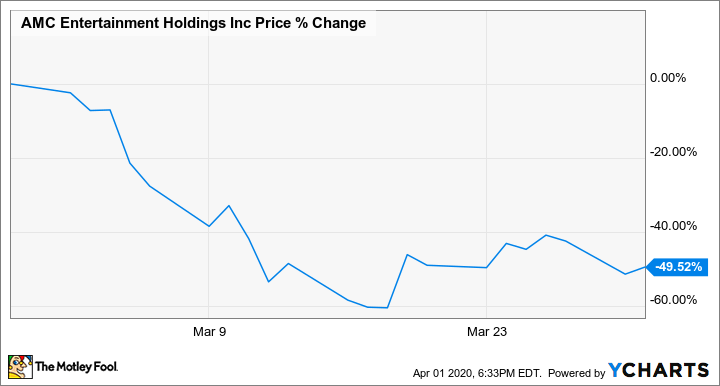What happened
Like much of the consumer discretionary sector, shares of AMC Entertainment (AMC -1.24%) fell off a cliff last month as the coronavirus spread across the country, forcing the closure of movie theaters as a number of states issued "stay-at-home" orders.
By March 17, the company said it would close all of its theaters in the U.S. for six to 12 weeks. Not surprisingly, that helped drive a 50% decline in the stock last month, according to data from S&P Global Market Intelligence.
As you can see from the chart below, the stock's plunge came mostly in the first half of the month, as the market anticipated trouble for businesses that function as gathering places.
So what
Coming into March, AMC was already showing signs of weakness, as the company said it would slash its generous dividend in late February in order to shore up its cash position.

Image source: Getty Images.
The stock fell sharply in the first week of March, along with other gathering places, and the new James Bond movie "No Time To Die" was postponed from April to November, the first big sign of change in the theater business. By the second week of March, the company announced that it would limit seating in its auditoriums to 50% capacity, a move that seemed to briefly lift the stock, as it was a sign that the company could continue to do business during the crisis.
Finally, the stock hit its nadir on March 17 after saying that all theaters would be closed for at least six to 12 weeks, as a number of states ordered movie theaters to close and the federal government recommended against gatherings of more than 10 people.
Through the last two weeks of the month, the stock recovered some of those losses amid a broader recovery in hard-hit discretionary stocks as the federal government approved a $2 trillion rescue package -- even as the company furloughed all 600 of its corporate staff, including the CEO.
Now what
April has gotten off to an equally inauspicious start for the movie theater operator as the stock plunged 17% on April 1, according to a report in The Wall Street Journal that the company's lenders have hired restructuring lawyers, a sign of AMC's increased risk of going bankrupt.
With its U.S. theaters closed indefinitely, the company has no way of generating revenue in its biggest market. The longer the outbreak persists, the more the stock is likely to fall.





